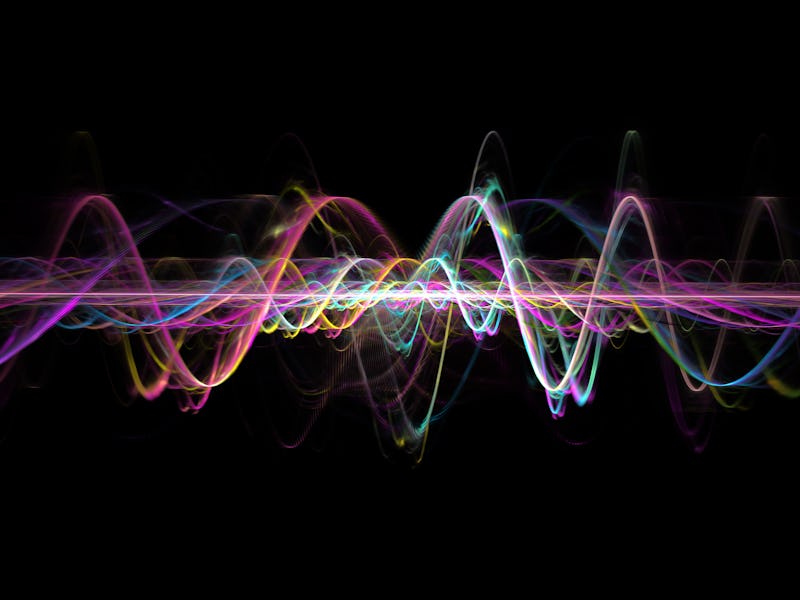Why the benefits of "binaural beats" may be bunk
These "digital drugs" have limited effects, new study shows.

When you hear two slightly mismatched sounds, an odd thing can happen. You start to hear a third sound, a rhythmic beat that does not exist. Don’t believe me?
Try it for yourself, here. This strange auditory illusion is called a binaural beat, a phenomenon that’s been linked to stress relief, mood changes, pain modulation, and better sleep.
But new research puts these “sensational claims,” as one researcher puts it, under fire. Binaural beats don’t affect the mind or body any more than monaural — normal or regular — beats, the new study, published Monday in the journal eNeuro, suggests.
“We are not saying at all that there is no effect of binaural beats; that’s still an open question,” Guillame Dumas, a researcher at the University of Paris, tells Inverse.
Binaural beats do induce brain wave entrainment, or brain waves synchronizing to a rhythmic sonic stimulus, but not any better than normal beats.
“Compared to monaural beats, we observed less effect on the brain,” Dumas says. In both types of beats — binaural and monaural beats — the team did not observe a significant effect on mood or cognition.
“The study is bringing some reality into the sensational claims about that. The claims that binaural beats will help memory or attention or relaxation seem a bit fuzzy to us, based on our results.”
Feeling the beat
First discovered in 1839, binaural beats didn’t hit the mainstream until 1973, when a Scientific American article brought them to the forefront. From that point on, psychedelic music incorporating binaural beats became the soundtrack for counter-culture and New Age movements. Some even call binaural beats “digital drugs,” inducing an enlightenment-like state. Over the years, anecdotal claims from listeners, combined with companies seeking to cash in on their popularity, created tons of hype around binaural beats, Dumas explains.
Some studies have shown binaural beats may modulate mood, pain perception, and memory. But Dumas says these studies relied on small sample sizes, not necessarily showing strong evidence.
"The problem is the pressure for scientists to 'publish or perish,' forcing researchers to publish more, positive results over negative results." And scientific journals are also inclined to publish positive results, not negative ones.
To test the claims, Dumas and the research team rigorously analyzed binaural beats’ effects on a group of 16 healthy volunteers. First, the group filled out questionnaire capturing general information and musical ability. Then the team hooked each participant to an electroencephalogram (EEG), a head cap that measures electrical brain activity.
Throughout the experiment, the team advised participants to sit still, close their eyes and focus on the beat. To get a baseline to work from, the team first recorded the group’s mood and brain activity as they sat still for eight minutes. Then, the group listened to four kinds of binaural and monaural beats, for eight minutes each. After every period, the participants rated their mood and experience in a survey — how relaxed, engaged, or absorbed they were when they listened to the beats.
After analyzing the results, Dumas and his team found that both binaural beats do “entrain” the brain. Basically, binaural beats can help brainwaves get in sync to the beat. They also saw that binaural beats induced cross-frequency patterns of neural connectivity (which monaural beats did not), but whether that influences mood or cognitive ability isn’t clear.
Visual abstract summarizing the teams' new research.
The team didn’t see any significant effect on the participants’ mood or cognition — they weren’t any more blissed out or focused than they were just sitting still for eight minutes.
“Maybe, just being focused on a sound or scenery — basically taking the time to relax — explains more variants on the change of mood than this auditory trick,” Dumas speculates.
More research is needed to figure out which, if any, type of “sonic therapy” has measurable effects.
There’s an app for that
The team’s research throws a wrench in the various apps, websites, and music packages promising stress relief and happiness from listening to a binaural audio track. Dumas says these companies often capitalize on people’s desire to find the ultimate solution to stress.
“People think, ‘Ok I will buy this binaural beat app and maybe it will help,’ without critically thinking, ‘Is it backed by science? And maybe not buying the app and just having a walk outside, or resting, or getting away from their phone would have a better impact.”